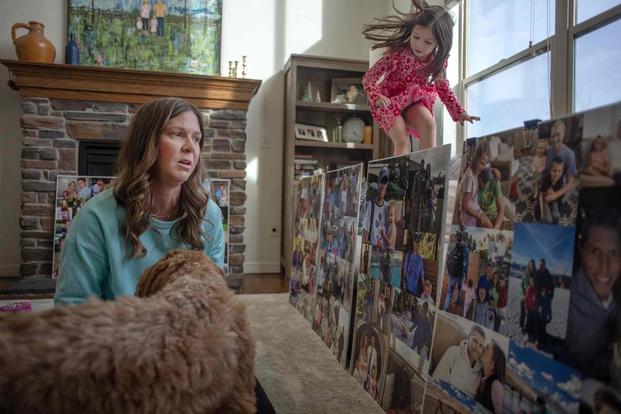The widow of an Air Force missileer who died of non-Hodgkin lymphoma has finally secured Department of Veterans Affairs benefits connected to her late husband's passing, a major achievement as more troops who worked with America's nuclear missiles fear they may have developed cancer from their service.
Jenny Holmes lost her husband, Air Force Maj. Mark Holmes, on May 12, 2020. He died at 37, approximately 30 years younger than the average age of those diagnosed with non-Hodgkin lymphoma, an aggressive blood cancer that attacks the lymph system. He had served on active duty at Malmstrom Air Force Base in Montana overseeing intercontinental ballistic missiles but was a reservist when he died -- which complicated the process for applying for survivor's benefits.
Her fight to secure VA benefits was highlighted in a Military.com investigative series, supported by the Pulitzer Center, that explored the cancer concerns of Air Force missileers and maintainers who believe that the Cold War-era facilities they worked in to keep watch over America's nuclear missiles were filled with toxic dangers and carcinogens that made them sick.
Read Next: Hegseth Grilled About Women in Combat, Officer Purge in Confirmation Hearing
"Just receiving the VA benefits is a huge blessing, but I'm receiving the benefits because my husband's not here and he's not coming back, and so there's a lot of conflicting emotions," Holmes told Military.com in an interview Tuesday. "So, I was tearful. It's been over a four-year journey, fighting with the VA."
Holmes had been repeatedly denied benefits since her husband died. Military.com reviewed screenshots and photos of the correspondence with the VA confirming this month that she qualified for dependency and indemnity compensation.
Her yearslong struggle with the VA was not unique. Military.com reported that many missileers diagnosed with cancer after their service have not received benefits related to illnesses because they didn't think they qualified, or had been previously told their diagnoses were not connected to their military service.
Holmes credits Military.com's reporting, among other outreach efforts from family, friends and grassroots organizations, as making it possible to spread awareness about her struggle.
"I think every piece of the puzzle helped," Holmes said. "I think the media attention absolutely helped."
Her late husband's father, Dan Holmes, a retired lieutenant colonel and former Air Force missileer himself, had started expressing concerns to military leaders and lawmakers about the case as well.
"Beyond the financial peace of mind that we all have, what I think this decision does is it illustrates that the VA has finally recognized my son's sacrifice," Dan Holmes said. "We're hoping the Air Force will do the same."
Last year, Military.com's investigation showed that two studies in the early 2000s raised warnings about potential cancer clusters among missileers at Malmstrom, but the service took no action.
It wasn't until nearly two decades later, in 2023, that a Space Force officer and former missileer from Malmstrom released a presentation showing alarming cancer rates, notably non-Hodgkin lymphoma, among those who served at the Montana base.
Shortly after that presentation went public, Air Force officials announced a large health study and environmental probe into all the intercontinental ballistic missile bases -- Malmstrom; Minot Air Force Base in North Dakota; and F.E. Warren Air Force Base in Wyoming.
In November, Air Force officials announced that they had about 50% of the data they needed in the study. Based on those initial results -- which included Department of Veterans Affairs electronic records, as well as some cancer registries from the VA and Department of Defense stretching back to the 1970s -- those preliminary results did not appear to show higher cancer rates among those who worked with missiles as compared to the public and the rest of the service.
More results in the ongoing health study are expected this year. Jenny and Dan Holmes hope that their effort to secure VA benefits will give hope to those missileers and family members who have been grappling to prove their illnesses are service-connected.
"It's not been my goal, or I don't think Jenny's goal, to make Mark and his death an example or to set a precedent for anyone else," Dan Holmes said. "But if it does, then all the better. There are a lot of families out there who have already experienced the pain that we've gone through."
Related: They Stood Sentry over America's Nuclear Missile Arsenal. Many Worry It Gave Them Cancer.














